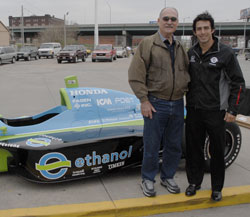 A consumer watchdog group is questioning the credibility of a widely reported Stanford University study warning that ethanol use could be harmful.
A consumer watchdog group is questioning the credibility of a widely reported Stanford University study warning that ethanol use could be harmful.
The Foundation for Taxpayer and Consumer Rights says the school’s ties to ExxonMobil make the study’s findings “difficult to accept.”
ExxonMobil has given $100 million to fund Stanford’s Global Climate and Energy Program (GCEP). Though the ethanol study was not directly funded by that program, the author had a three-year grant from GCEP to study the impact of replacing fossil-fuel motor vehicles and electric power plants with hydrogen fuel cell vehicles and power plants.
The public cannot accept the results at face value when ExxonMobil has funded a major energy research program at the university and research results are in line with the giant oil firm’s corporate goals, FTCR said.
ExxonMobil Chairman Rex Tillerson is dismissive of ethanol’s prospects, recently telling Fortune Magazine, “I don’t have a lot of technology to add to moonshine.”
The study based on computer models has received widespread publicity, despite the fact that the model is controversial because it assumes complete conversion to ethanol use rather than partial.


 Purdue University researchers are opening the pores of corn to try and increase ethanol yield.
Purdue University researchers are opening the pores of corn to try and increase ethanol yield.  It’s time for another Indy race. This time in Kansas City. It’ll be the Kansas Lottery Indy 300 this Sunday. This morning though the Ethanol Promotion and Information Council put on another pump promotion at the Snappy Store downtown. Pictured here are Snappy Stores owner, Ken Suter (left), and Jeff Simmons, Team Ethanol driver. They’re posing next to the new Team Ethanol show car which is looking pretty slick.
It’s time for another Indy race. This time in Kansas City. It’ll be the Kansas Lottery Indy 300 this Sunday. This morning though the Ethanol Promotion and Information Council put on another pump promotion at the Snappy Store downtown. Pictured here are Snappy Stores owner, Ken Suter (left), and Jeff Simmons, Team Ethanol driver. They’re posing next to the new Team Ethanol show car which is looking pretty slick.
 The
The  E85 Everywhere is a public-private partnership which seeks to achieve 1,800 E85 fueling outlets in Minnesota over the next few years. The purpose is to help achieve the state’s 20% ethanol-use goal, enacted by the 2005 legislature. The partnership is also supported by the
E85 Everywhere is a public-private partnership which seeks to achieve 1,800 E85 fueling outlets in Minnesota over the next few years. The purpose is to help achieve the state’s 20% ethanol-use goal, enacted by the 2005 legislature. The partnership is also supported by the 
 The National Biodiesel Board is vowing to fight what it considers abuse of the biodiesel tax credit. According to
The National Biodiesel Board is vowing to fight what it considers abuse of the biodiesel tax credit. According to  Ethanol and the Indy Racing League will be in the spotlight at the
Ethanol and the Indy Racing League will be in the spotlight at the 

 A New Zealand technology company has secured $3.5 million in private venture capital to develop ethanol from carbon monoxide.
A New Zealand technology company has secured $3.5 million in private venture capital to develop ethanol from carbon monoxide.